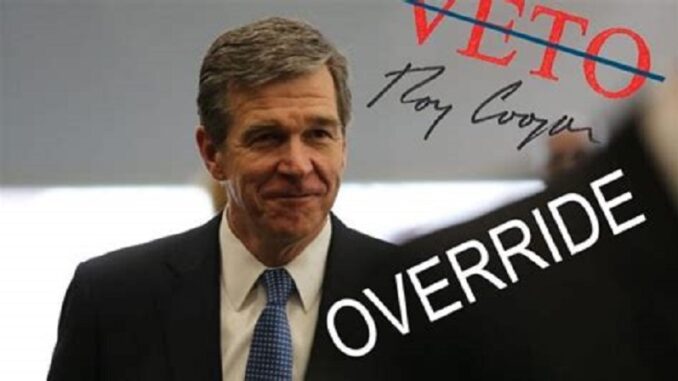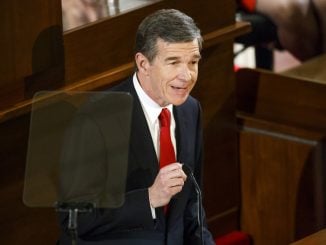
RALEIGH — The state legislature voted Tuesday for the 10th veto override since Gov. Roy Cooper has been in the Executive Mansion, well more than half of his 13 total vetoes. The lawmakers needed a three-fifths vote to override, voting in the Senate Monday night 26-15 along party lines and in the House Tuesday morning, 72-40. Two Democrats voted in favor of overriding the governor’s veto: Reps. William Brisson (D-Bladen) and Elmer Floyd (D-Cumberland).
This time the override is on an election bill aimed at making it easier to get third-party candidates on the state’s election ballots, but also canceling the 2018 judicial primaries. Lawmakers say they want to allow newly eligible candidates to be able to get a closer look at planned new judicial district maps. The effort to update judicial district lines was launched over the summer by Rep. Justin Burr (R- Stanly), but some members of both parties say its overdue.
“The North Carolina House is carefully implementing changes to judicial districts, giving candidates for the court more certainty and fairness as they analyze changes to the elections process,” House Speaker Tim Moore (R-Kings Mountain) said in a statement. “The House is responding to input from court officials by allowing judicial candidates time to fully consider the impact of potential redistricting before deciding whether or not to file.”
Senate Bill 656, the Electoral Freedom Act of 2017, says that for just the 2018 election cycle judicial candidates will run during the general election alone, with a filing period in June. It also makes it easier for a third party to be officially recognized in N.C. and reduces the number of petition signatures required for unaffiliated candidates to get on general election ballots. The measure also lowers the percentage of votes required to avoid a runoff in primaries from 40 percent to 30 percent.
Cooper and other opponents say the bill is cutting off voter access by canceling the 2018 judicial primaries.
“The legislature is angry that their bad laws continue to be overturned by the courts, and their solution to abolish a scheduled election and once again take away voters’ rights is wrong,” said Cooper in response to the override Tuesday. “This is the first step toward a constitutional amendment that will rig the system by moving to partisan, legislative selection of judges. Allowing legislators to pick their own judges for political reasons is a bad idea.”
The Libertarian Party of N.C. was strongly critical of Cooper’s veto.
“The governor claims this is the ‘the first step toward a constitutional amendment that would rig the system so that the legislature would pick everybody’s judges in every district instead of letting the people vote for the judges they want.’” said party leader Brian Irving in a press release. “This reasoning is curious because no such constitutional amendment bill exists. And even it did, a majority of North Carolina voters would have to approve it. So how would that be rigging the system?”
Cooper won the state’s gubernatorial election in 2016 by 10,277 votes. In that election statewide turnout was more than 68 percent. However, in the 2010 primaries, overall voter turnout for more than three-quarters of N.C. counties was less than 25 percent and a quarter of counties had 10 percent turnout or less.
“This override vote will not only improve ballot access for third-party and unaffiliated candidates, it will also bring certainty to our judicial election schedule and allow time for a thorough discussion about the best system to ensure the most highly qualified judges are on the bench in North Carolina,” said Senate Leader Phil Berger (R-Rockingham) in a statement Monday.
Unaffiliated voters are expected to impact coming elections in big ways. Since 2008, unaffiliated voter registrations have surged nationwide by nearly 30 percent. In N.C. this fall unaffiliated registrations passed Republicans for the first time to become the second largest voter group in the state with 2,058,201 voters, according to the State Board of Elections and Ethics Enforcement. Democrats still have the largest number of voters in the state with 2,640,729, but have lost 101,600 party members since 2009. Republican registrations have grown by 51,000 registered voters in that time.



